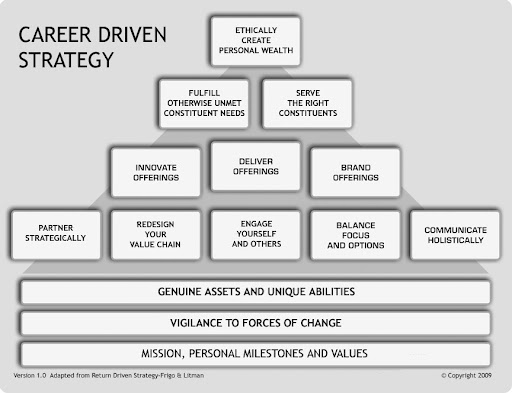Want to know the soundtrack of your coffee break? Check out how these brands nailed their collaboration!
| From the desk of Miles Everson: Welcome to “Return Driven Strategy (RDS)!” I hope you’re having a great day so far. For those of you who don’t know yet, RDS is a pyramid-shaped framework with 11 tenets and 3 foundations, and was created by my friend and colleague, Professor Joel Litman, and his co-author, Dr. Mark L. Frigo. When applied properly, these principles help businesses achieve their organizational objectives. In this article, we’ll talk about the application of this framework in a particular business’ strategy. Keep reading below to know how this global coffeehouse hit all the right notes in this partnership. |
Want to know the soundtrack of your coffee break? Check out how these brands nailed their collaboration! Picture yourself walking into your favorite coffee shop… The aroma of freshly brewed espresso fills the air, baristas call out orders with effortless precision, and a carefully curated playlist hums in the background. You don’t think twice about it, but that music? It’s not just background noise—it’s an experience, one that subtly shapes how you feel, how long you stay, and even what you order! Ah, what a sweet melody to the ears! … but what if you could take that moment with you, turning a quick coffee run into something much BIGGER? That’s exactly what Starbucks and Spotify envisioned when they joined forces in 2015. Their strategic partnership wasn’t just about playing good music in coffee shops; it was also about deepening customer engagement, creating brand loyalty, and offering a seamless blend of digital and physical experiences. This collaboration serves as a masterclass in Return Driven Strategy ’s (RDS) Tenet Seven— Partner Deliberately —showing how two brands can enhance each other’s value while delivering something exceptional to their audiences.
Brewing Success Together Starbucks, the world’s largest coffeehouse chain, has always placed a strong emphasis on ambiance. … and a BIG part of that? Music! Music has been an integral part of the coffeehouse’s in-store experience, setting the mood for customers who want to sip, study, or socialize. Meanwhile, Spotify, the leading global music streaming platform, was looking for ways to expand its reach and connect with new audiences in real-world settings. In 2015, the two brands formed a strategic alliance that seamlessly blended their strengths. Starbucks stores began featuring hand-picked Spotify playlists, turning the café experience into a more immersive and personal one. Employees were granted access to Spotify Premium, allowing them to share and influence in-store playlists, adding a layer of human touch to the music selection. Furthermore, Starbucks Rewards members who linked their accounts to Spotify gained access to exclusive music content and even had a say in the store’s playlist selections. Awesome, right? This partnership wasn’t just about music and coffee—it was also about creating a cohesive, interactive experience that resonated with customers in meaningful ways. So… what made this collaboration a win-win? The Starbucks-Spotify partnership worked because it enhanced the customer experience while fostering brand loyalty. Here’s how:
At the heart of this partnership lies Tenet Seven of Professor Joel Litman and Dr. Mark L. Frigo ’s Return Driven Strategy (RDS)—Partner Deliberately. Similar to what Professor Litman and Dr. Frigo wrote in their book, “Driven,” Starbucks and Spotify didn’t just collaborate for the sake of partnership or collaboration; they intentionally combined their strengths to create something greater than the sum of its parts. … and the outcome of that? Results that hit all the right notes! The collaboration between Starbucks and Spotify led to tangible benefits, proving the effectiveness of their partnership:
Lessons from the Starbucks-Spotify Playbook Clearly, these companies’ partnership is a testament to the power of strategic collaboration. Brands looking to form successful alliances can take away key lessons from this case study:
In the world of strategic partnerships, this collaboration serves as a shining example of how two brands can work together deliberately and successfully. So, the next time you find yourself sipping a latte while vibing to the perfect playlist, remember—it’s not just a coincidence; it’s also a carefully crafted experience, brewed to perfection. — If you’re looking to gain a better understanding of Return Driven Strategy and Career Driven Strategy, we highly recommend checking out “Driven” by Professor Litman and Dr. Frigo. Click here to get your copy and learn how this framework can help you in your business strategies and ultimately, in ethically maximizing wealth for your firm. Hope you found this week’s insights interesting and helpful. Stay tuned for next Tuesday’s Return Driven Strategy! The market is no longer just about efficiency nor scale. Today, it’s rewarding those who are pouring capital in tomorrow’s innovations. Learn more about creative destruction in next week’s article! |

Miles Everson
CEO of MBO Partners and former Global Advisory and Consulting CEO at PwC, Everson has worked with many of the world's largest and most prominent organizations, specializing in executive management. He helps companies balance growth, reduce risk, maximize return, and excel in strategic business priorities.
He is a sought-after public speaker and contributor and has been a case study for success from Harvard Business School.
Everson is a Certified Public Accountant, a member of the American Institute of Certified Public Accountants and Minnesota Society of Certified Public Accountants. He graduated from St. Cloud State University with a B.S. in Accounting.




